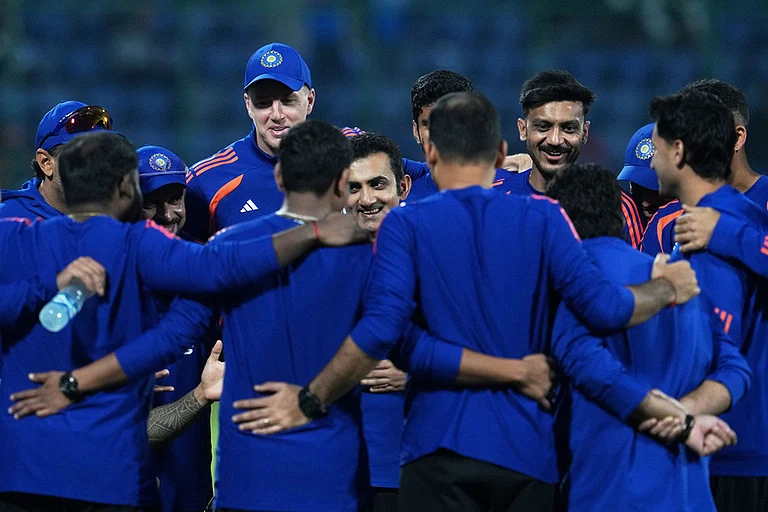Facing flak from the Opposition leaders for putting several senior political leaders under house arrest in Jammu and Kashmir after the revocation of Article 370 of the Constitution, including former Chief Minister Farooq Abdullah, the BJP has said that Union Home Minister and party President Amit Shah has "no role" in slapping of the Public Safety Act (PSA) against the National Conference (NC) leader.
In an interview to IANS, Jammu and Kashmir Bharatiya Janata Party (BJP) chief Ravinder Raina said, "When Shah made a statement on the floor of the House in Rajya Sabha on the abrogation of Article 370 on August 5, on that day there was no case against Farooq Abdullah."
"But after the passage of a few days the agencies (security and intelligence agencies) submitted the report that he may lead troubles in Kashmir valley. And it was the reason why the security agencies took the necessary action," the BJP leader said.
Giving a clean chit to the BJP national President's role in the slapping of PSA against Farooq Abdullah, who is also an MP from Kashmir, Raina said, "Shah has nothing to do with the slapping of PSA against any of the leaders, including Farooq Abdullah."
Warning the political leaders, Raina said, "One thing is clear, whosoever it is, whatever might be his/her past history, anybody who tries to break the country, divide the nation, instigate the youth, he/she will never be spared and the law will take its own course."
Raina was responding to a question over Shah's remarks in the Rajya Sabha that Abdullah was neither arrested nor detained, but was at his home "out of his own free will".
However, the Jammu and Kashmir administration last month informed the Supreme Court that the NC leader has been put under house arrest at his Srinagar residence as PSA was slapped against him.
After the Centre decided to revoke the special constitutional status accorded to Jammu and Kashmir (J&K) under Article 370, two months ago, the region was placed under a communications blockade and several mainstream political leaders, including the father-son duo (Farooq Abdullah and Omar Abdullah) and Peoples Democratic Party (PDP) chief and former Chief Minister Mehbooba Mufti were put under house arrest.
Responding to a question why only Opposition party leaders were arrested or put under house arrest in Jammu and Kashmir for the last 60 days, the BJP leader said, "No cases have been registered against any of them. But some of the leaders are trying to create anarchy and mess and they will be taken to task because no one is above law."
Raina said if anyone tries to instigate any section of the society against the country "it comes under sedition charges". "And anybody who tries to break the country will never be spared," he said.
On October 2, the Jammu and Kashmir administration has ended the house arrest of almost all political leaders in Jammu belonging to the NC, Congress and Jammu and Kashmir National Panthers Party (JKNPP). After the release from detention, NC's Jammu provincial chief Davinder Singh Rana met Farooq Abdullah and his son Omar Abdullah on Sunday in Kashmir.
They were allowed to meet the father-son-duo after they requested Governor Satya Pal Malik for the meeting on Friday.
Besides the former Chief Ministers, several other prominent leaders in Kashmir still continue to remain under house arrest.
Over 250 writ petitions have been filed against the preventive detention orders against prominent political leaders in Jammu and Kashmir while petitions have also been filed in the Supreme Court against the detentions.
To a question when the Opposition leaders will be freed from the detention, Raina said, "The decision to release the political leaders lies with the security agencies and they shall take a call after getting inputs from security and intelligence agencies."
On the question of new investments in the state as promised by the Centre and several other private industries showing interest, Raina said that after the abrogation of Article 370 the government will give all sorts of support to the industrialists to establish their units in Kashmir.
"It will boost the economy of Jammu and Kashmir and it will give the opportunity to the youngsters to get the job over here," he said.
Raina said that earlier the state has witnessed brain drain for long and "if in the near future we have all sorts of the Information Technology sectors, and other sectors coming to the state, this will boost the employment and economy of Jammu and Kashmir."
He also said that the Union government under its Make in India initiative is also planning to bring big IT institutions and many mega projects here."Even many big hospitals like Medanta, Apollo and Max are in talks to bring their institutions here," he said.
Referring to the Article 370 as the "wall of hatred" in Jammu and Kashmir, the BJP leader said: "It did criminal injustice with the people of the state not only with the Hindus, but with the west Pakistani refugees, Gorkhas, Valmikis, Gorkhas but Gujjar, Wagarwals, Pahadis and even the common man."
"But now all will be eligible to get jobs in Jammu and Kashmir as the Article 370 has been abrogated," Raina added.
(IANS)


























